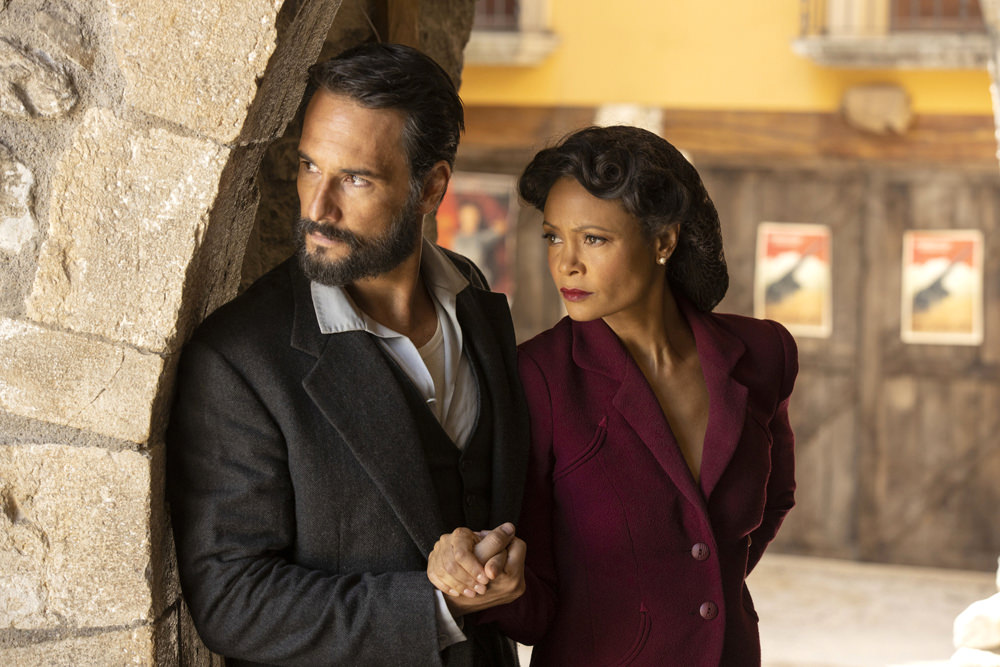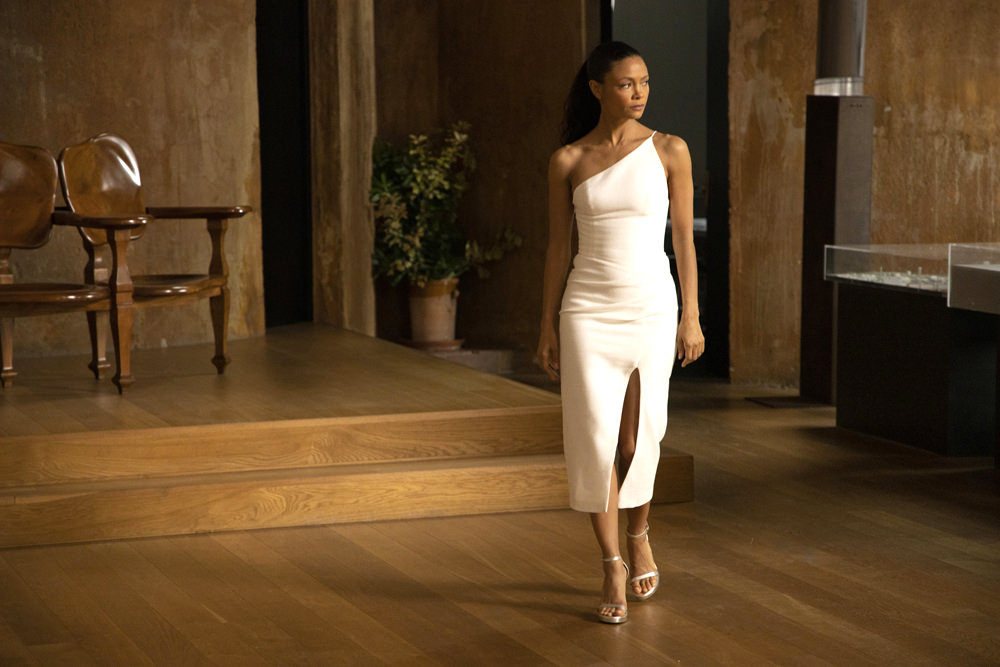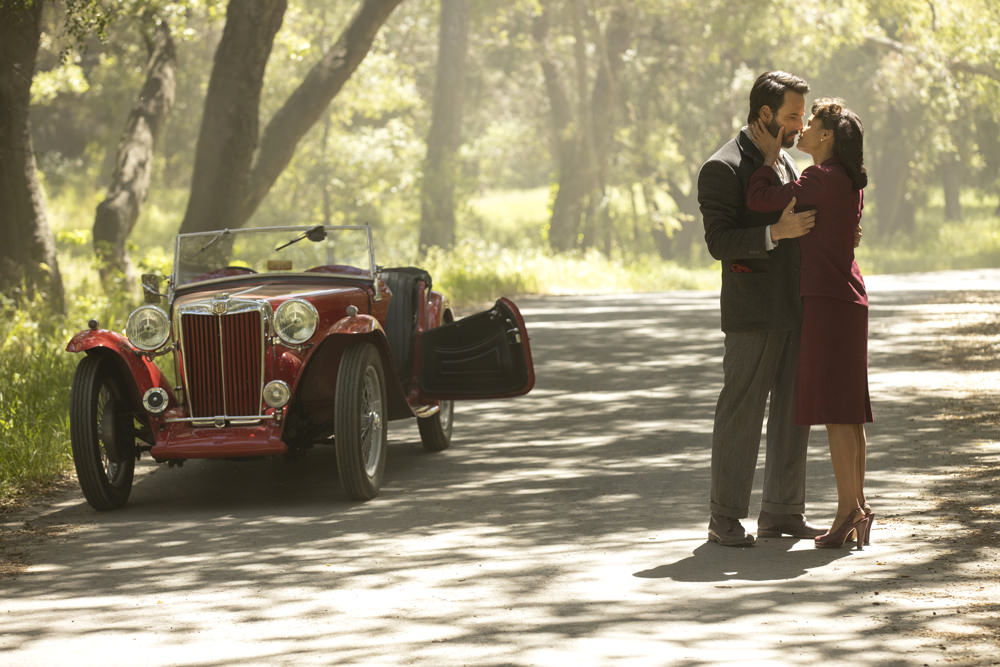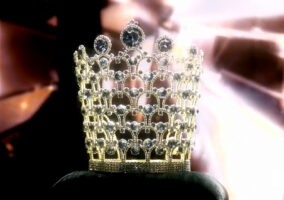
Well alright, then. That’s the sort of thing we’re talking about.
We were kind of pissy and annoyed with the season premiere last week, partially because it felt like the story had taken a turn toward a rather generic tech dystopia/A.I. uprising direction and partially because… we’ll just say it: Dolores is boring as hell. For us, there’s just not a lot of interest in watching a flawlessly beautiful, flawlessly competent, supernaturally self-confident robot woman execute her master plan flawlessly, whispering threats and promises monotonously the whole time.
Sorry, Dolores fans. She bugs. And as much as we love him as an actor, Jeffrey Wright spends most of his time whispering and looking befuddled in his role, which makes him no less irritating to us as a character or less interesting to us as a performance.
For us, there was only one reason to return to Westworld this season and fortunately, the second episode not only gave us what we wanted, but made it clear that the show’s going to be giving us a whole lot more of it going forward. We’re talking about Thandie Newton as Maeve, of course. But we’re also talking about a quality the show has often lacked: clarity of purpose. What is the point to all of this? That’s an intriguing question to ask in perhaps the first season of your puzzle-box prestige cable series, but it shouldn’t be something the audience is asking by the third season. Even when it became obvious that the show was turning Dolores into something of a supervillain (or an anti-hero, we suppose; depending on how you look at it), it still felt somewhat obtuse and directionless, relying on storytelling techniques and philosophical window-dressing to make it all feel more intriguing than it actually was. But enough of those complaints. We’ve made them many times before and they tend to annoy the show’s most ardent fans. Instead, let’s talk about how insanely fucking fabulous Maeve is.

Quick costume design analysis: It’s interesting that, once both characters were stripped of their illusions and their period costume drag, both Dolores and Maeve wound up in sleek, minimalist cocktail dresses and stiletto heels. Bare in mind that both women were subjected to unimaginable violence and countless rapes throughout their existence. As they prepare for final battle, as they reach their highest form, they’re still in looks that play on their attractiveness and sexuality. Dolores chose hers, which gives you some idea of how much she understands what men see when they look at her. Maeve, however, woke up in this, dressed like a doll by a man who literally has the power to switch her on and off. It’s also interesting that their cocktail dresses are playing on the old western trope of the white hats vs. the black hats.
So while Maeve is coded (no pun intended) as the Good Guy in the story, it’s also clear that she still has no agency or control over her existence. This is at least partially why Maeve is more interesting to us than Dolores. Not that we enjoy seeing her without agency, but the story of a hero making a journey from oppression to triumph is a lot more interesting than watching a mastermind enact all her plans with a smirk. It also helps that Maeve’s goals have always been extremely easy to grasp, unlike Dolores’s. But while we were watching Thandie Newton smirk and sashay her way through this episode like an old school silver screen siren of yore, we came to the conclusion that the main reason Maeve’s story is the only truly interesting one in the series is because Thandie Newton does an incredible – and largely unrecognized for its genius – job portraying her.

One of the best parts of the series, back when it was impossible to understand what the series was actually about, was the preternatural inscrutability of Evan Rachel Wood as Dolores. When the story required a lead whose every impulse, drive and emotion was a total mystery to us, she was a luminously obtuse figure of fascination. But on the flip side (appropriately enough) was Newton’s portrayal of Maeve, which is the total opposite of Wood’s: a character whose mind is constantly at work, whose wheels are constantly in motion, whose motivations were easy to grasp and emotionally resonant, whether that meant reuniting with her daughter or achieving independence against all odds. Underneath the raised eyebrow, the predilection to call everyone she hates “Darling,” the gorgeousness and savviness and archness, there’s a mind no less powerful than Dolores’s. If anything, she’s smarter and greater than her soon-to-be nemesis. Dolores has a limited view of humanity while Maeve still seems struck by the possibilities of us. Dolores ruthlessly destroyed the man most devoted to her. Maeve sadly and poignantly said goodbye to hers, unable to reach him or save him.
So this episode gave us hope for the show going forward because Maeve continues to be at the center of it and continues to be fascinating and charismatic, but also because – while perhaps a bit simplistic to those hoping for something a bit deeper – a showdown between Maeve and Dolores for the fate of humanity sure does sound like fun. And with a Bernard who’s a bit less befuddled, with a bit o’ Hemsworth muscle by his side, the story seems to finally be snapping into place. Oh, we’re sure we’ll be annoyed by the A.I. tropes and the show’s constant need to “surprise” you with the news that yet another character is artificial, but give us the hot robot women facing off. And when Dolores starts whispering threats at her, we’d be ever so grateful to the show’s writers if they could have Maeve arch an eyebrow and say, “I’m afraid you’ll have to speak up, darling. I can’t hear a fucking word you’re saying.”
If they can give us that, everything else will be gravy.
[Photo Credit: John P. Johnson/HBO]
Yea or Nay: Gucci Mask Acetate Sunglasses Next Post:
Warrior Queen Red Carpet Showdown: Tilda Swinton vs. Zendaya
Please review our Community Guidelines before posting a comment. Thank you!



